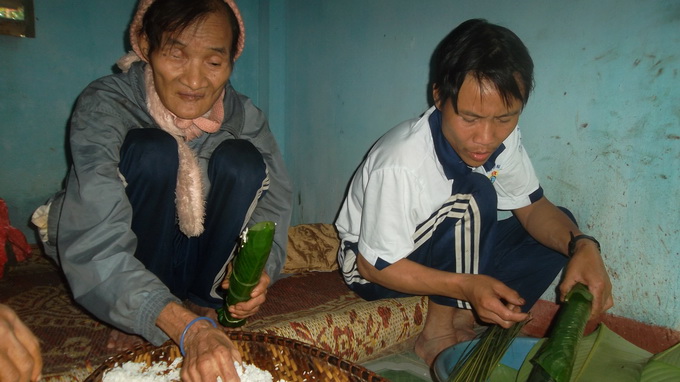Five months after returning to civilized society after living 40 years in isolation in a remote forest in central Vietnam, the two ‘jungle men’ – father and son – have integrated well into their new life in central Quang Ngai Province. They are now taking part in preparations for Tet (Lunar New Year) celebration.
>> Former jungle men depicted in documentary>> Familiar conditions should be created for “jungle men”: scientist >> Why did veteran lead 4-decade hermit life in jungle? >> Tale of 2 rescued jungle men who lived 40 years in forest>> 2 jungle men found after 40 years living in Vietnam forest
With the encouragement of their relatives and the support of local authorities, 83-year-old Ho Van Thanh, the father, and his son Ho Van Lang, 43, left the forest to return to Tra Phong Commune, Tay Tra District on August 7, 2013.
Local authorities and benefactors have built a house for the two men to live, while their relatives and local residents helped the men to re-integrate into the community.
After returning to the commune, Thanh and his son have got used to their new environment and adapted themselves to civilized life. The old man brought Lang to leave their native land in 1974 in a special situation.
At present, along with their relatives and neighbors, they are making preparations for celebrating Tet (Lunar New Year), which will falls on January 31.
83-year-old Ho Van Thanh is practicing to make bánh tét (Photo: Tuoi Tre)
A few days ago, Tuoi Tre visited the former jungle men at their home, in Tra Nga Hamlet, and witnessed they joining others in making bánh tét, a sticky rice cake filled with bananas or fat pork and mung bean – one of the kinds of traditional Vietnamese cakes.
Lang was very happy to learn how make bánh tét from his young brother, Ho Van Tri. Their father Thanh also actively took part in making the cake to celebrate Tet.
No longer like to live in forests
A Tuoi Tre reporter asked Lang, “Do you like Tet?,” and he replied in the language of Cor, an ethnic minority group, “Trot xa tet” (“[I] like Tet very much”).
Lang then sang the song “Như có Bác Hồ trong ngày vui đại thắng” (If only Uncle Ho were here on the joyful day of victory) in the language of the majority Kinh people – the official and common language of Vietnam.
Locals said that children in the hamlet had taught Lang to sing the song.
The two former jungle men, especially Lang, have integrated rapidly into their new life, local residents comments.
Ho Van Lang, 43, is sweeping the front yard of his new house (Photo: Tuoi Tre)
When asked whether he likes to return to the forest where he and his father had lived for 40 years, Sang said in Cor, “Pe trôt man mơq gôk” ([I] don’t like to live there anymore).
Pointing his hand to his house, he said, “Hnhư đơuh quơ gô” (My new house). He also took us to the back yard of the house, where a buffalo was tied, and said, “O kpieu gô” (My buffalo).
He then laughed and said, “Trot Plây gô” ([I] like my village).
The new life of Lang and his father has recently depicted in a documentary titled “Lang ve nha moi” (Lang at his new home), which was produced by a group of young reporters at Quang Ngai Radio and Television Station. The 28-minute film portrays humans’ combat for survival in the most extreme conditions and highlight locals’ concern and care in helping the two men reintegrate into society.























































